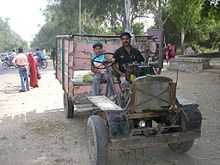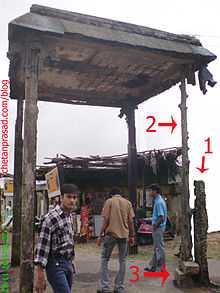Jugaad

Jugaad or Juggaar is a Hindi-Urdu term widely used in India and Pakistan and by people of South Asian origin around the world. Jugaad (also sometimes jugarh "krantirath" or jugard) is a term applied to a creative or innovative idea providing a quick, alternative way of solving or fixing a problem. Jugaad literally means an improvised arrangement or work-around, which has to be used because of lack of resources.
Mohd. Arafine, Assistant Professor at Meerut Institute Of Engineering and Technology, Meerut Uttar Pradesh India, has termed "Jugaad" as "LOCAL INTELLIGENCE", because it's actually an Intelligence of people, which they use to develop and design any concept to fulfill their local needs due to lack of resources.
The same term, Jugaad, is given to locally made motor vehicles, used mostly in small villages as a means of low cost transportation in rural India. Carpenters make these vehicles by fitting a diesel engine on a cart.
The Jugaad movement has gathered a community of enthusiasts, believing it to be the proof of Indian bubbling creativity, or a cost-effective way to solve the issues of everyday life. It is commonly used when describing a workaround to get through commercial, logistical, or legal issues. Sometimes, jugaad may refer to an idea from which a person can control his or her budget, or from which they may acquire luxuries, sometimes through illegal means, such as the theft of electricity, gas etc.[1]
Etymology and variants
Punjabi Language pronounces it Jugard or Jugaad, Sanskrit Language also pronounces the word as yukti, colloquial yugat and Hindi Language pronounces it Jugate.[citation needed]
Low-cost vehicle

Jugaads cost around Rs. 50,000 (less than US$1,000). They are powered by diesel engines originally intended to power agricultural irrigation pumps. They are known for poor brakes, and cannot go faster than about 60 km/h (37 mph). The vehicle often carries more than 20 people at a time in remote locations and poor road conditions. Today, a jugaad is one of the most cost effective transportation solutions for rural Indians.
Though no statistical data is available, it is reported that there are a number of instances of failing brakes, requiring a passenger to jump off and manually apply a wooden block as a brake. These vehicles do not have any vehicle registration plate, as they are not registered with the Regional Transport Office (RTO). Hence, no road tax is paid on them.
Jugaads are not officially recognised as road-worthy, and despite a few proposals to regulate them, vote-bank politics have trumped safety concerns. The improvised vehicles have now become rather popular as a means to transport all manner of burdens, from lumber to steel rods to schoolchildren.[2] For safety reasons the government of India has officially banned Jugaad vehicles.[3]
Vehicle variants

A variant of the Jugaad vehicle in Tamil Nadu in South India is the Meen Body Vandi. This roughly translates to "fish bed vehicle" because they originated among local fishermen who needed a quick and cheap transport system to transport fish. It is a motorised tri-wheeler (derived from the non-motorized variant)[4] with a heavy-duty suspension and a motorcycle engine—typically recycled from Czech Yezdi or Enfield bullet vehicles. Its origins are typical of other Jugaadu innovations—dead fish are typically considered unhygienic, and vehicles that carry them cannot be typically used to carry anything else. Similar vehicles can be found throughout much of Southeast Asia.[5]
Jugaad as a concept

Jugaad is also a colloquial Hindi word that can mean an innovative fix or a simple work-around,[6] sometimes pejoratively used for solutions that bend rules, or a resource that can be used as such, or a person who can solve a complicated issue. It is used as much to describe enterprising street mechanics as for political fixers. This meaning is often used to signify creativity to make existing things work or to create new things with meagre resources.
The jugaad concept can be contrasted with the Western (originally American) concept of a hack or kludge. Although in its general meaning "hack" is very similar to "jugaad", a jugaad can be thought of more as a survival tactic; in contrast, a hack, especially nowadays, is seen an intellectual art form. Both concepts express a need to do what needs to be done, without regard to what is conventionally supposed to be possible.
Jugaad is increasingly accepted as a management technique[7] and is recognised all over the world as an acceptable form of frugal engineering at peak in India.[8] Companies in India are adopting Jugaad as a practise to reduce research and development costs.[9] Jugaad also applies to any kind of creative and out of the box thinking or life hacking, which maximises resources for a company and its stakeholders.
Criticism

The practical applications and implementations of Jugaad often defy established processes, at the risk of creating safety issues. There are several instances of Jugaad fixes failing, at the cost of lives and money.[citation needed]
Some argue that, stripped of its disregard for safety, Jugaad is simply another word for ‘Frugal Innovation’, propagated simply for its eastern, esoteric and mystical allure, which overshadow the underlying urge to save cost and maximise profit.[citation needed]
See also
- Life hacking
- Rickshaw
- Tonga (carriage)
- Transport in India
- Kludge, an American-English term of similar meaning.
- Bodge, an English term of similar meaning.
- Chindōgu, a Japanese term for useful but unusual inventions
Notes
- ↑ "Jugaads: Innovations by and for common Indians".
- ↑ "Bal Mandir Public School Transportation".
- ↑ "Govt issues order to seize jugaads". The Times of India. indiatimes.com. Retrieved 12 July 2013.
- ↑ "Indian Tripurteurs A7".
- ↑ "Motor Tricycle-Motor Tricycle Manufacturers, Suppliers and Exporters on alibaba.com".
- ↑ Jugaad Innovation Think Frugal, Be Flexible, Generate Breakthrough Growth.. Jossey-Bass Inc Pub. ISBN 1118249747.
- ↑ "Jugaad: A New Growth Formula for Corporate America". Harvard Business Review Blog Network. 25 January 2010.
- ↑ "India's Next Global Export: Innovation". Bloomberg Businessweek. 2 December 2009.
- ↑ "A snip at the price". The Economist. 28 May 2009.
- Further reading
- Navi Radjou, Jaideep Prabhu, Simone Ahuja, Kevin Roberts (2012). Jugaad Innovation: Think Frugal, Be Flexible, Generate Breakthrough Growth. Wiley. p. 288. ISBN 978-1-1182-4974-1.
- Rishikesha T. Krishnan. From Jugaad to Systematic Innovation: The Challenge for India.
- Barun S. Mitra. "India’s 'Informal' Car". Asian Wall Street Journal, page 10, 26 Jan 1995.
- MCCLELLAN, PHILIP. "Is Jugaad Going Global?". Ny Times.
- Rajnish Tiwari, Cornelius Herstatt http://www.tuhh.de/tim/downloads/arbeitspapiere/Working_Paper_72.pdf. "Open Global Innovation Networks as Enablers of Frugal
- Innovation: Propositions Based on Evidence from India".
- DATTOPADHYE, SAMIRSINH. "The New Management Mantra Jugaad".